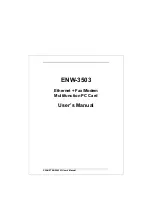
COMSPHERE 3900 Series Modems
5-16
September 1998
3910-A2-GN32-40
Table 5-1
(7 of 10)
DTE Interface Configuration Options
LSD Control: Stndrd_RS232
Nxt Stndrd_RS232 Forced_On WinkWhenDisc Follows_DTR Sim_Cntl_Car =DTR/DiscOFF
Line Signal Detect Control. LSD is a signal indicating that the carrier signal is being received from the
remote modem. It is normally turned OFF to the DTE when the power level of the received carrier signal
drops below the carrier detect threshold.
H
Standard RS232
LSD is ON when the modem detects the remote modem’s carrier signal. LSD turns OFF when the
carrier signal strength drops below carrier detect threshold.
H
Forced On
Forces LSD to be ON at all times.
H
Wink When Disconnect
LSD is normally forced ON, but can be turned OFF for 1 to 2 seconds upon a disconnect. This is
used for UNIX DTEs.
H
Follows DTR
The state of LSD follows the state of DTR. When DTR turns ON, LSD turns ON. When DTR turns
OFF, LSD turns OFF.
H
Simulated Control Carrier
LSD follows the state of RTS of the remote DTE via the V.13 simulated control carrier signaling.
This is required for hosts that cannot support full-duplex operation. If LSD Control is set to
simulated control carrier, then the RTS Action configuration option on the remote modem must be
set to Simulated Control Carrier.
H
=DTR/Disconnect OFF
The state of LSD follows the state of DTR except when disconnecting once a connection is
established. In this instance, DTR remains ON and LSD turns OFF. DTR must then toggle OFF
and then ON again for LSD to turn ON. This setting is required for AT&T DATAKIT dial-out
applications.
NOTE: If LSD Control is set to =DTR/DiscOff, then the DTR Action configuration option must be set to
Stndrd_RS232.
The AT command for Forced On is &C0.
The AT command for Standard RS232 is &C1.
The AT command for Wink When Disconnect is &C2.
The AT command for Follows DTR is &C3.
The AT command for Simulated Control Carrier is &C4.
The AT command for =DTR/Disconnect OFF is &C5.
















































